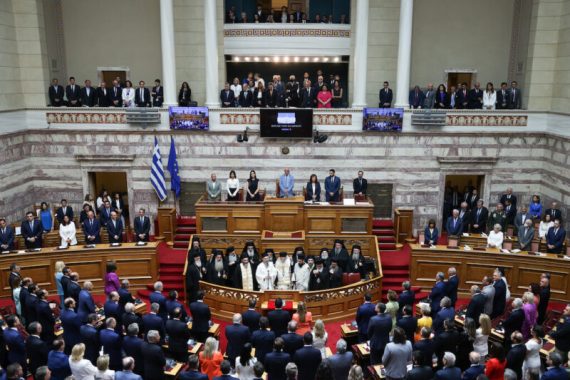A
lthough on May 21 New Democracy (ND) won the general election in Greece securing the high percentage of 40.79 of the votes, it didn’t win the parliamentary majority which required an additional five seats. In May 2023, ND returned the mandate to form a government without seeking a coalition, as an amendment to the electoral code stipulates that the winning party will be granted additional parliamentary seats effective from the most recent election. As none of the other parties could form a coalition government, runoff elections were set for June.
On June 25, in line with expectations, ND won the elections with 40.55% of the vote, winning 50 additional parliamentary seats. In 58 out of 59 constituencies, ND came first, lagging behind the Coalition of the Radical Left – Progressive Alliance (SYRIZA) only in Rhodope, a region in Western Thrace that is home to people of Turkish origin.
It is not surprising that ND, the flagship of the center-right in Greek politics, has become so powerful given the country’s economic and geopolitical situation. When the 2009 debt crisis took its toll, SYRIZA, with its radical rhetoric, was seen by the masses as a savior against the center-right ND and the center-left PASOK. However, despite winning both elections in 2015, SYRIZA failed to secure a parliamentary majority and had to share power with the nationalist Independent Greeks (ANEL) party.
A rapid privatization drive
During this period, the party stepped back from its radical rhetoric, concluded a debt restructuring agreement with the EU, and failed to implement its own program on economic policies, civilianization, secularism, and human rights. Therefore, no one was fully satisfied with its volatile economic and foreign policies. In the 2019 general elections, New Democracy came back to power on its own, promising economic growth and full alignment with the Western world.
In its first term in power, ND implemented these promises. Since coming to power in 2019, the first Kyriakos Mitsotakis government has launched a rapid privatization drive and sought to attract foreign investment by offering incentives and facilities to various entrepreneurs. It has focused on tourism, production, energy, and technology. The harmonious relations it has developed with the West provided confidence to foreign investors and facilitated the procurement of foreign resources. As a result, in 2019 and 2021, Greece achieved the highest levels of foreign investment in its history in proportion to its annual income. It also prepared a comprehensive program of reforms and projects in 2021, securing €17.77 billion in grants and €12.73 billion in loans from the EU Rescue Fund.
As a result, since the COVID19 pandemic, the Greek economy has grown at an average annual rate of more than 7%. Exports, which were less than $40 billion a year before the pandemic, reached $57.5 billion in 2022. Last year, the EU terminated the Single Supervisory Mechanism (SSM) on Greece with the view that the structural conditions that led to the crisis. In the near future, international credit rating agencies are also expected to rate Greece “investment grade” for the first time since 2010. Thus, Greece will be able to attract even more foreign investment and cash money in the coming years.
Turkey and the EU
New Democracy’s economic policies make even more sense when considered in conjunction with its foreign policy. In foreign policy, as in the economy, the Greek government has identified the Euro-Atlantic alliance as its sole and undisputed geopolitical direction. Presenting itself as a loyal and reliable ally of the Western world, Greece has taken advantage of its geographical position in the increasing competition between Russia and the West, and has aspired to be assigned to various tasks and responsibilities. By doing so, it has increased its geopolitical importance by strengthening its interdependence with the Western world, especially in the fields of defense and energy.
For the same purpose, the Mitsotakis government did not hesitate to use Turkey’s problems with the Western world to its advantage. Killing several birds with one stone, Greece obtained diplomatic and military support from countries such as the U.S. and France, and ensured decisions against Turkey were being taken at the EU level. At the same time, Greece sought new cooperation opportunities with its active diplomacy against Turkey in various regions of the world, especially in the Eastern Mediterranean. These opportunities found support in the Western world.
Between 2019 and 2023, a period characterized by numerous crises and security risks at the global and regional levels, ND achieved visible results in both the economy and foreign policy by pursuing neoliberal economic policies and a purely Western-oriented foreign policy. Of course, these policies had negative consequences as well. The easing of taxes on big capitalists in the name of investment incentives, the significant burden of public revenues on middle- and low-income citizens through indirect taxes, and the limited increases in the minimum wage and public salaries have led to a steady increase in income inequality under ND’s rule.
Recommended
Train crash
The opposition has blamed the Greek government for the train crash on February 28 in which 57 people were killed, while the Greek government failed to adequately address infrastructure deficiencies due to frugality in public spending. In the name of order and stability, the government has pursued ruthless policies against asylum seekers, and it was revealed that the phones of politicians and journalists who were considered to be a threat to the government were tapped. In foreign policy, the confrontation with Turkey posed a significant security risk for the country, while increased military expenditures put an additional burden on the budget.
Despite such criticisms, it appears that the Greek public prefers a decisive and consistent course in the fields of economy and foreign policy. Faced with three major crises in recent years—the refugee crisis, the coronavirus pandemic, and the Russia-Ukraine war—Greece needs Western support as the severe effects of the debt crisis continue. Given these factors, by virtue of its political-ideological profile New Democracy stands out as the party that can maintain relations with the West at the most advanced level. Moreover, ND, which has a nationalist-conservative base as well as a liberal one, can appeal to a wide audience through populist rhetoric and practices. Thus, for example, the statements made by ND officials regarding the conflicts with Turkey and the support that Mitsotakis receives in the Western world have a positive effect on the party’s image in the eyes of the public.
When Mitsotakis came to power in Greece for the first time, he said that it would take two terms for the country to truly recover. At the end of the first term, macroeconomic indicators led the public to believe that the crisis was being overcome, while steps taken by the government in production, exports, and development gave hope for the future. Moreover, in a period full of crises and geopolitical risks, the support that Mitsotakis has received from the Western world is considered important by a large part of the Greek public.
Thus, despite all the existing problems, voters in Greece brought ND back to power. We can already foresee that the policies of New Democracy, which has solidly won the approval of voters in two consecutive elections, will continue in the same direction. However, time will tell for how long the public will remain patient while awaiting the concrete effects on daily life of the macro indicators of economic policies. Moreover, the preference of the second Mitsotakis government to feed on disputes with Turkey instead of seeing the post-earthquake détente as an opportunity to strengthen mutual understanding and co-operation could lead to larger crises in the Aegean and Eastern Mediterranean than those of the past.






